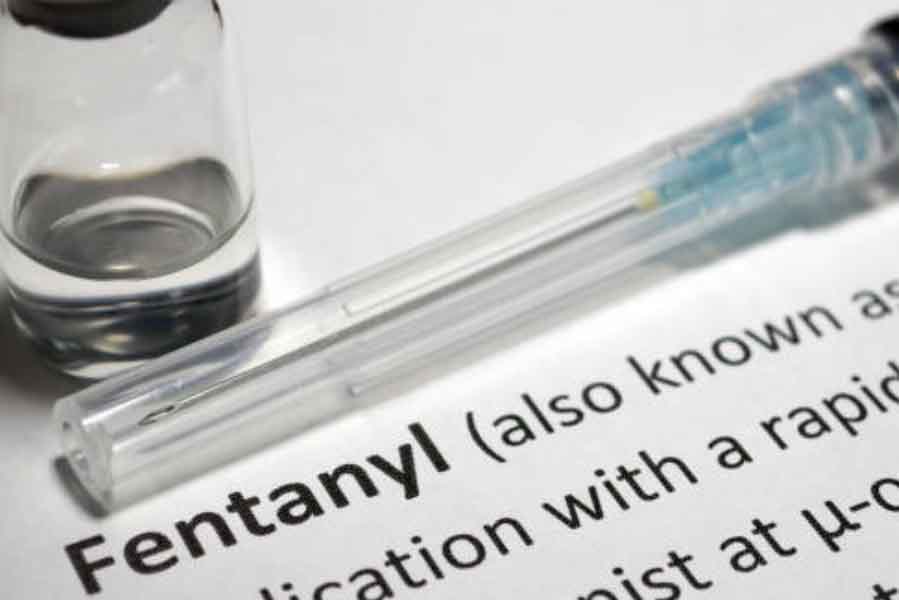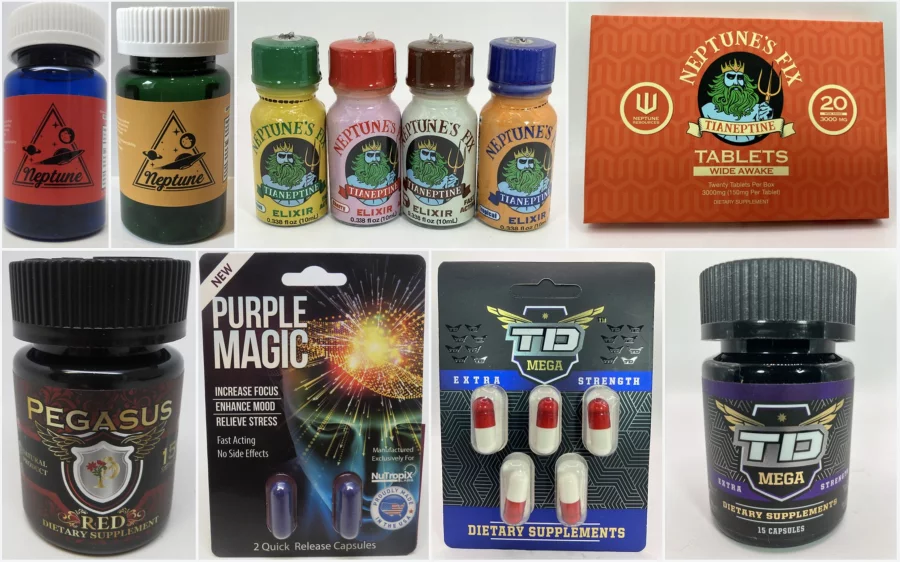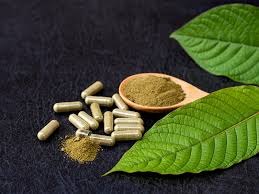Current Drug Trends

Fentanyl Facts
Fentanyl is a powerful, synthetic opioid. There are two types: pharmaceutical and illegal. The pharmaceutical fentanyl is used for legitimate purposes by medical professionals. Usually pharmaceutical fentanyl is used when a patient has severe pain, including serious car accident victims or those suffering from advanced stages of cancer.
But recently there has been an increase in illegal fentanyl that is in the illicit drug supply across our county. It is added to illicit drugs because it is very potent. This makes the drugs more powerful and cheaper to make.
In Atlantic County fentanyl and fentanyl analogs contribute to more than 90% of overdose deaths. Even in small doses, it can be deadly. Over the last few years, nonfatal and fatal overdoses involving fentanyl have continued to rise.
Drugs may contain deadly levels of fentanyl, and you would never know. You aren’t able to see, taste or smell fentanyl. It is practically impossible to tell if drugs contain any fentanyl unless you test them.
Fentanyl Misconceptions
Fentanyl poses significant risks, especially when ingested or absorbed through specific mucous membranes. It is highly potent.
The belief that fentanyl is dangerous to touch stems from concerns about its potency. However, research and expert opinions clarify that casual contact with fentanyl does not lead to absorption through the skin in a way that would cause harm. For instance, touching surfaces like a car door, door knob or currency that may have traces of fentanyl does not result in significant exposure.
The only exception to this is the medically prescribed fentanyl transdermal patch, which is designed for slow and controlled absorption over time. Even with this patch, it requires hours of skin contact for any effect to occur.
Understanding these distinctions is important in reducing fear and misinformation surrounding fentanyl while still acknowledging the significant dangers associated with its improper use or accidental exposure through other means.
Xylazine
Xylazine, also called “tranq”, is not an opioid. It is a tranquilizer designed for animals. It is not approved for human consumption. Similar to fentanyl, it is being found in the illicit drug supply and often involved in overdose deaths. When used by humans, xylazine slows down breathing and lowers blood pressure and reduces heart rate. It also causes several withdrawal symptoms and wounds that can become infected.
Because xylazine can cause serious wounds, it is important for people who use xylazine to take proper care of the wounds.
Wound Care
- Seek medical attention if a fever develops, if the wound changes color, gets bigger or doesn’t heal after a few days.
- Wounds should be covered and kept clean. It is important to change bandages regularly. Non adherent bandages are best to use.
- When changing bandages, was the wound thoroughly. Soap and water or a saline solution should be used.
- Avoid rubbing alcohol and hydrogen peroxide.
- Before rebandaging the wound, place a thin layer of vaseline on the wound.
- If injecting additional drugs, the wound area should be avoided.
Medetomidine
Medetomidine is a powerful non-opioid sedative used in veterinary medicine that has recently been found in illicit drug supplies. It has been called “Rhino Tranq”. Its side effects include intense sedation, with a loss of responsiveness that can last up to six hours. As medetomidine is not approved for human use, its clinical effects are based on veterinary research. Medetomidine is one hundred times more potent than xylazine and causes a greater and longer-acting sedation.
Tianeptine

Tianeptine is an antidepressant that is being sold in gas stations and convenience stores in New Jersey. It is neither FDA-approved nor regulated for use in the United States. Also referred to as “Gas Station Heroin”, “ZaZa,” “Neptune’s Fix,” and “Pegasus Silver,” tianeptine is being falsely marketed as a safer alternative to opioids and a dietary supplement for various health conditions.
Risks of Tianeptine Use
The New Jersey Poison Control Center has recently reported a series of tianeptine poisonings. Exposure to tianeptine can lead to severe, life-threatening effects, including seizures, coma, and even death.
BTMPS
BTMPS – (Bis 2,2,6,6-tetramethyl-4 piperidyl sebacate), has appeared as an adulterant in the illicit drug supply in New Jersey and other states. It, sold under the brand name Tinuvin770 as an industrial chemical not intended for use in humans or animals. It is used as a protective coating on plastics as well as manufacturing commercial fragrances and candles.
As of December 15, 2024, BTMPS has been seized 92 times throughout New Jersey.
Six overdoses, four fatal and two non-fatal, have included this chemical in suspected heroin found at the scenes.
BTMPS also appeared in powder form and in counterfeit pills. Like xylazine and medetomidine, BTMPS lowers blood pressure. BTMPS can smell like bug spray or plastic and individuals who ingested it have reported side effects including blurred vision, nausea, sedation, hallucinations and severe coughing after ingestion. According to the DEA, BTMPS may be known as “fish dope,” “bug spray dope,” “the bis,” or “boat glue.”
Kratom

Kratom is a tropical tree native to Southeast Asia. Its leaves are used to produce over-the-counter herbal supplements. According to the Drug Enforcement Administration (DEA),consuming its leaves may result in psychotic symptoms, psychological dependence, and physical dependence.
In recent years, kratom has become well-known as a natural supplement for pain management and as an alternative to opioids. Kratom exhibits stimulant-like properties at lower doses, promoting alertness, while higher doses act as a sedative and produce opioid-like effects. The active ingredients in kratom bind to the brain’s opioid receptors, similar to scheduled opioids.
Kratom has been shown to be addictive, and its withdrawal symptoms can be similar to those of opioid withdrawal. Research on kratom is ongoing and continues to evolve. The FDA currently warns about the potential for addiction and abuse, and there are no FDA-approved medical uses for kratom.
Kratom is not scheduled under the Controlled Substances Act, however, some states have banned or regulated its use. In New Jersey, kratom is legal to purchase, sell, and consume. the DEA has listed kratom as a Drug and Chemical of Concern.
Tusi
Tusi (pronounced 2C) is a brightly colored poly drug mixture sold as synthetic cocaine. It is often referred to as “Pink Cocaine”, which is a misnomer as it often does not include cocaine. Tusi mixtures can contain a variety of drugs including: Ketamine, MDMA, Methamphetamine, Fentanyl and Xylazine. The presence of opioids in Tusi can pose significant risks, especially those without an opioid tolerance.
Users may exhibit confusion, nausea, vomiting, anxiety, agitation, violent behavior, increased heart rate and blood pressure, and full body convulsions.
Blues

Blues drug, often referred to as “blueberries” or “M30s, are illicit street pills that have become increasingly notorious for their powerful and dangerous effects. These small, blue tablets are typically designed to look like prescription opioids, such as oxycodone, but are often laced with highly potent synthetic opioids, most commonly fentanyl.
The high potency of fentanyl and other synthetic opioids drastically increase the risk of accident overdose. In addition to fentanyl, these pills may include various cutting agents and fillers, many of which are unknown or unregulated. Because they are produced illegally, the composition of blues pills is highly inconsistent, further amplifying their danger. Blues drugs are known by a range of street names, including “blueberries,” “M30s,” “Mexican Oxy,” and “Chinese Oxy.” The term “M30” refers to the pill’s typical imprint, which mimics that of authentic oxycodone tablets. This, combined with their blue coloring, is part of a deliberate attempt to pass these drugs off as legitimate pharmaceuticals. Such misleading presentation makes them particularly appealing and dangerous
